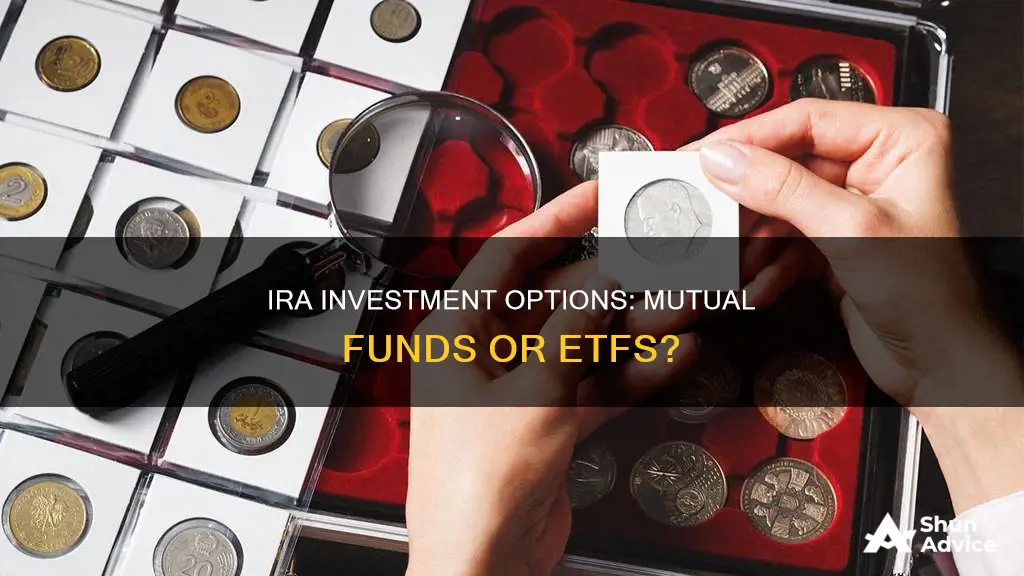
Exchange-traded funds (ETFs) and mutual funds are both investment vehicles that can help you save for retirement. ETFs are often considered more tax-efficient, as their structure minimises capital gains distributions to investors. They are also less expensive to own and trade more like stocks, making them more liquid. Mutual funds, on the other hand, can have higher expense ratios, especially when they are actively managed. So, which is the better option for your IRA?
| Characteristics | Values |
|---|---|
| Similarities | Both are professionally managed collections ("baskets") of individual stocks or bonds. |
| Both are less risky than investing in individual stocks and bonds. | |
| Both offer a wide variety of investment options. | |
| Both are overseen by professional portfolio managers. | |
| Differences | ETFs are traded on stock exchanges throughout the trading day; mutual funds are bought and sold at the end-of-day net asset value (NAV) price. |
| ETFs typically have lower expense ratios due to passive management; mutual funds can have higher expense ratios, especially when actively managed. | |
| ETFs are often considered more tax-efficient as they generate fewer taxable events. | |
| ETFs usually have no minimum investment requirements; mutual funds often do. | |
| ETFs trade like stocks; mutual funds are bought and sold without any bid-ask spread. | |
| ETFs are predominantly passively managed; mutual funds can be actively managed. | |
| ETFs generally do not have sales charges; mutual funds may impose sales loads. |
What You'll Learn

ETFs are traded on stock exchanges, mutual funds are bought from investment companies
Exchange-traded funds (ETFs) and mutual funds are similar in many ways. Both are professionally managed collections or "baskets" of individual stocks or bonds, offering investors a diverse selection of assets. However, there are some key differences between the two.
ETFs are traded on stock exchanges and can be bought and sold like individual stocks during open-market periods. They experience price changes throughout the day, and there are generally no investment minimum requirements. Investors can buy and sell one or multiple shares at the market price at any time during the day. ETFs also offer intraday trades, stop orders, limit orders, options, and short selling—features that are not available with mutual funds.
On the other hand, mutual funds are bought from investment companies and are executed once per day, with all investors receiving the same price, which is calculated at the end of the trading day. Mutual funds often require minimum dollar investments and cannot be purchased until after the market closes when the net asset value (NAV) is calculated.
When deciding between ETFs and mutual funds, it is essential to consider your investment goals and risk tolerance. ETFs offer more flexibility in terms of trading and usually have lower fees and better tax efficiency. Mutual funds, on the other hand, may be preferable if you want a more hands-off approach and are comfortable with the higher fees associated with active management.
The Mindset of Investment Fund Managers: Traits and Insights
You may want to see also

ETFs are passively managed, mutual funds are actively managed
When deciding whether to invest in an IRA in an ETF or mutual fund, it's important to understand the differences between the two. ETFs (exchange-traded funds) and mutual funds are similar in that they are both managed "baskets" or "pools" of individual securities, such as stocks or bonds, and they both offer exposure to a wide variety of asset classes and niche markets. However, there are some key differences to consider.
ETFs are passively managed, which means they attempt to closely track a benchmark, such as a broad stock market index like the S&P 500. The components of a passive ETF follow the underlying index or sector and are not at the discretion of a fund manager. Passive ETFs provide investors with greater flexibility to execute a buy-and-hold strategy compared to actively managed funds. They also offer lower expense ratios, increased transparency, and greater tax efficiency. Passive ETFs are subject to total market risk and lack flexibility, and are heavily weighted towards the highest-valued stocks in terms of market cap.
On the other hand, mutual funds are actively managed, meaning they have a fund manager who can adapt the fund to changing market conditions. Active mutual funds are managed by fund managers who make investment decisions on behalf of the investors. Mutual funds may also distribute income and capital gains. Mutual funds may involve more research and hands-on management, which can result in higher expense ratios. They can also generate capital gains within the portfolio, which are distributed to investors and can result in taxable events.
In terms of trading, ETFs trade like stocks and are bought and sold on a stock exchange throughout the trading day, while mutual funds are bought and sold at the end-of-day net asset value (NAV) price. ETFs typically have no minimum investment requirements, while mutual funds often do. ETFs are often considered more tax-efficient as they experience fewer taxable events than actively managed mutual funds.
Both ETFs and mutual funds have their advantages and disadvantages, and the best option for an individual will depend on their specific investment goals, risk tolerance, and preferences regarding the level of activity and management of their investments.
Index Funds: How Much Should You Invest?
You may want to see also

ETFs have lower expense ratios
Exchange-traded funds (ETFs) typically have lower expense ratios than mutual funds. This is largely due to passive management, where ETFs track an index rather than attempting to beat the market through active trading. Actively managed funds tend to have higher expense ratios, as they require more research and hands-on management. The average expense ratio for an actively managed fund was 0.59% in 2023, compared to 0.11% for passively managed funds.
ETFs are also more tax-efficient than mutual funds. Their passive management structure means they generate fewer taxable events, minimising capital gains taxes for investors. Actively managed mutual funds, on the other hand, tend to incur higher capital gains taxes as their assets are bought and sold more frequently.
The lower expense ratios and tax efficiency of ETFs can result in higher long-term returns, making them a more favourable option for retirement savings in an IRA.
However, it's important to note that ETFs may not always be the cheapest option. It's essential to compare the fees and expenses of both ETFs and mutual funds before making an investment decision. Additionally, mutual funds have their advantages, such as being less niche-oriented and offering more diversification.
Smart Mutual Fund Investments: 16K Options
You may want to see also

ETFs are traded throughout the day, mutual funds at the end of each day
Exchange-traded funds (ETFs) and mutual funds have many similarities. Both are professionally managed, offering a wide variety of investment options and giving investors access to a diverse selection of assets. However, there are some key differences to consider when deciding which to invest in.
ETFs are traded on stock exchanges throughout the trading day, providing investors with intraday trading flexibility. This means that the price at which you buy an ETF will likely differ from the prices paid by other investors. ETFs also offer more hands-on control over the price of your trade, with real-time pricing and more sophisticated order types.
On the other hand, mutual funds are bought and sold at the end-of-day net asset value (NAV) price. This means that all investors who bought and sold that day will receive the same price, which is calculated after the trading day is over. This lack of intraday pricing means that mutual funds offer less flexibility for investors who want to actively trade during the day.
The differences in trading times between ETFs and mutual funds can have an impact on the level of control an investor has over the price of their trade. ETFs provide more opportunities for investors to use different order types and make trades throughout the day, allowing for more sophisticated and precise trading strategies. Mutual funds, on the other hand, offer a simpler approach with less complexity and a guaranteed end-of-day price for all investors.
When deciding between investing in ETFs or mutual funds, it is important to consider your investment goals, risk tolerance, and preferred level of trading activity. Both options provide diversification and access to various asset classes, but ETFs offer more intraday trading flexibility, while mutual funds provide a simpler approach with a single daily price for all investors.
Private Equity Funds: Impact Investing Strategies Revealed
You may want to see also

ETFs are more tax-efficient
When it comes to choosing between investing in an IRA with ETFs or mutual funds, there are several factors to consider, and one of the key differences lies in their tax efficiency. Here's why ETFs are generally considered more tax-efficient:
Passive Management and Lower Capital Gains Taxes
ETFs are often passively managed, meaning they automatically track a pre-selected index such as the S&P 500. This passive nature leads to fewer portfolio changes, resulting in lower capital gains distributions to investors. In contrast, mutual funds are typically actively managed, with fund managers frequently buying and selling assets in an attempt to beat the market. These active trades can generate capital gains, which are then passed on as taxable events to investors, even if they haven't sold their shares.
In-Kind Creation/Redemption Mechanism
ETFs have a structural advantage called the in-kind creation/redemption mechanism, which further minimizes the capital gains they distribute. Mutual funds, on the other hand, often trigger capital gains taxes for shareholders when securities are sold within the fund, even if the investment has decreased in value since the initial purchase.
Tax Efficiency in Taxable Accounts
The tax efficiency of ETFs becomes especially important when they are held in taxable accounts outside of tax-advantaged retirement accounts like IRAs or 401(k)s. In such cases, the tax benefits of ETFs can provide significant advantages, as you won't pay capital gains taxes unless you eventually sell the shares for a profit.
Long-Term Cost Savings
While mutual funds may have higher fees due to active management, ETFs' passive nature and lower expense ratios can result in substantial cost savings over the long term, positively impacting your retirement savings.
Bond Fund Investment: What Percentage is Smart to Invest?
You may want to see also
Frequently asked questions
Exchange-traded funds (ETFs) and Mutual Funds are both investment vehicles that pool investor money into a collection of securities, exposing investors to a wide range of assets without having to purchase and manage them individually. However, there are some key differences:
- ETFs are usually passively managed, whereas Mutual Funds are actively managed.
- ETFs are traded throughout the day, whereas Mutual Funds are priced and traded at the end of each trading day.
- ETFs are often cheaper than Mutual Funds, with lower expense ratios.
- ETFs are sold only in full shares, whereas Mutual Funds can be purchased in fractional shares.
- ETFs are priced based on market price, whereas Mutual Funds are sold based on a flat dollar amount.
ETFs offer several advantages:
- Lower fees: ETFs tend to have lower expense ratios compared to Mutual Funds, resulting in higher long-term returns.
- Tax efficiency: ETFs are structured to minimise capital gains distributions, reducing tax liability upon withdrawal.
- Flexibility: ETFs have no minimum investment requirements, making them accessible to investors with limited capital.
- Trading flexibility: ETFs can be traded during the day, providing intraday trading flexibility.
- Diversification: ETFs typically own a diversified pool of investments, reducing risk and potential losses.
Mutual Funds also offer several advantages:
- Professional management: Mutual Funds are actively managed by professional fund managers who attempt to beat the market using their expertise.
- Automatic investments: Mutual Funds allow for automatic and recurring investments and withdrawals, making them suitable for investors who prefer a "set it and forget it" approach.
- Niche investing: Mutual Funds are less niche-oriented than ETFs and often track broader indices or benchmarks.
- Tax efficiency: While ETFs are generally more tax-efficient, Mutual Funds can also offer tax advantages, especially when held in tax-advantaged retirement accounts like IRAs.







